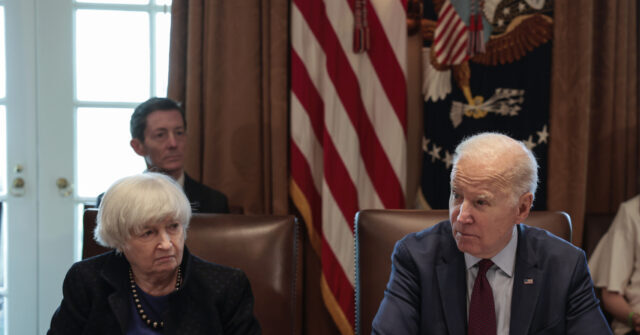Top News
Bidenomics: U.S. Budget Deficit Explodes 23% Higher to $1.7 Trillion

The U.S. budget deficit increased 23 percent to $1.7 trillion, an increase of $320 billion, in the year after the Biden administration pushed through the Inflation Reduction Act which it claimed would close the government’s funding gap.
The explosive growth in the deficit came as revenue fell $457 billion from a year ago and expenses decreased by just $137 billion. Total spending for the year came in at $6.134 trillion.
Spending would have been higher if the Supreme Court had not declared Biden’s student loan forgiveness program illegal.
The deficit adds to the U.S. debt total, which the government said earlier this week had reached $33.6 trillion. That is more than $250,000 per household and more than $99,000 per person in the U.S. The Pete G. Peterson Foundation has calculated that if every household in the U.S. contributed $1,000 a month to debt reduction, it would take 21 years to pay down the debt.
Bidenflation Busted the Budget
Much of the increase in the deficit can be chalked up to the runaway inflation sparked by super-sized spending programs—including the Inflation Reduction Act’s $500 billion in new expenditures and tax breaks, the $1.9 trillion American Rescue Plan, and $1 trillion of infrastructure outlays—pushed for by Biden administration.
As a result of inflation, Social Security’s cost-of-living adjustments drove up the program’s cost of $134 billion, for example.
The Federal Reserve was forced to raise interest rates at a record pace and downsize its mammoth balance sheet in an effort to bring down inflation, raising the cost of government borrowing. Outlays for interest on the public debt increased $162 billion, going from $475 billion to $659 billion.
Interest expense as a percentage of GDP rose to 3.3 percent, the highest level since 2001. According to the Pete Peterson Foundation, the U.S. government is spending $2 billion a day on interest payments.
Higher interest rates also lowered the amount of revenue the government receives from the Federal Reserve, adding to the deficit.
The banking failures triggered by higher interest rates resulted in a $101 billion increase in Federal Deposit Insurance Corporation outlays.
On Friday, President Joe Biden asked Congress to authorize aid to Ukraine and Israel, requesting a massive $106 billion in spending the administration claims will go to bolster “national security.” Around $61 billion of that total is for additional spending on aid to Ukraine.
Government revenues in 2023 fell to 16.5 percent of gross domestic product.
The Buck Stops…With The Other Guys
The Biden administration quickly blamed its predecessor for the budget shortfall, attempting to deny responsibility for the fiscal situation of the government.
“This year, the effect of the Trump tax cuts on revenues and deficits is clear,” said a White House official.
The administration continues to claim the economy is doing extremely well despite polls showing widespread rejection of Biden’s leadership on the economy.
“The U.S. economy remains resilient despite global headwinds,” Treasury Secretary Janet Yellen said.
While the consensus among economists no longer calls for a recession in the near term, a recent Wall Street Journal poll showed that the economy is expected to grow slightly less than one percent next year. The Conference Board said this week that it still expects the economy to fall into a “shallow recession” next year.
Read the full article here


















